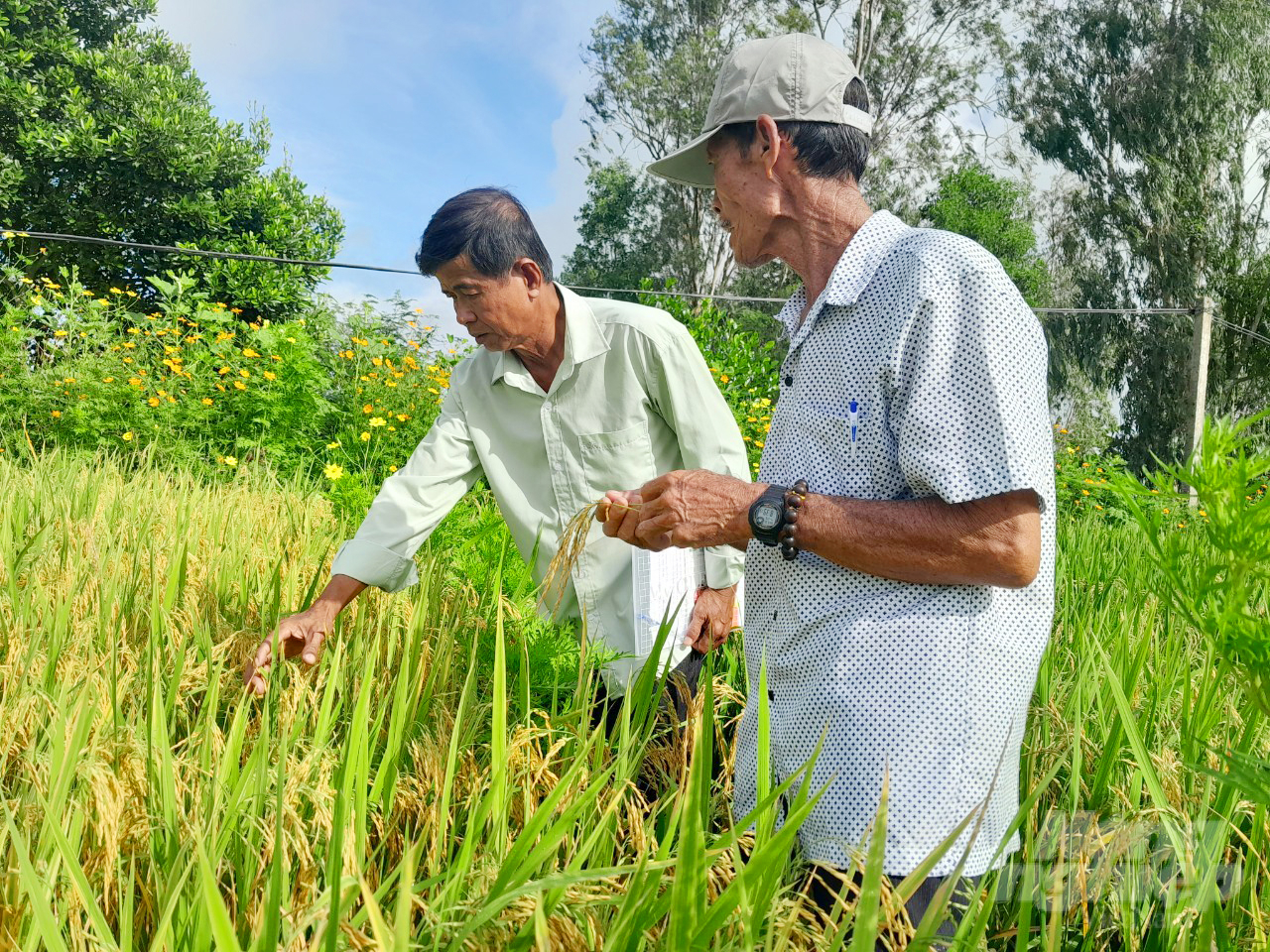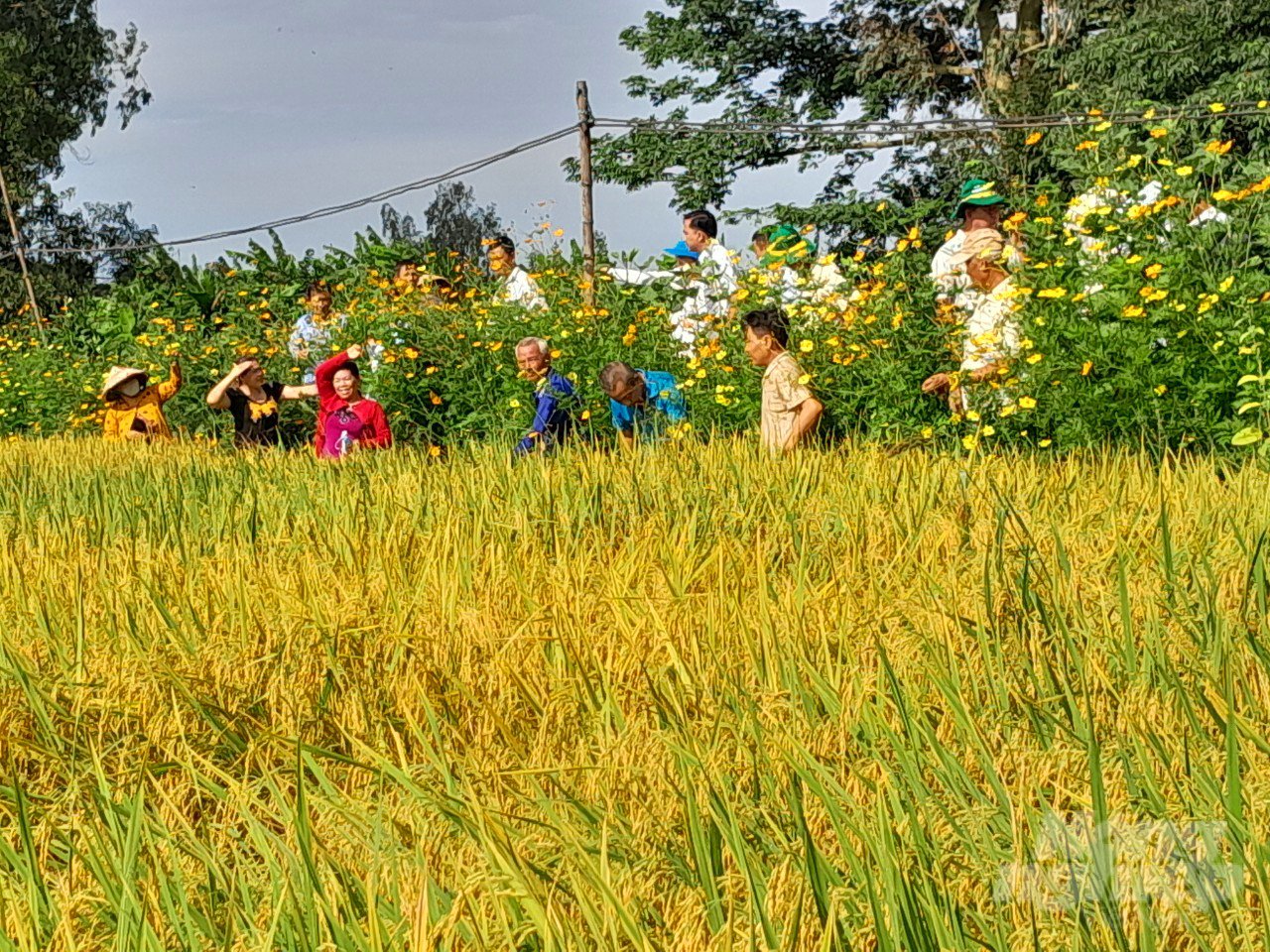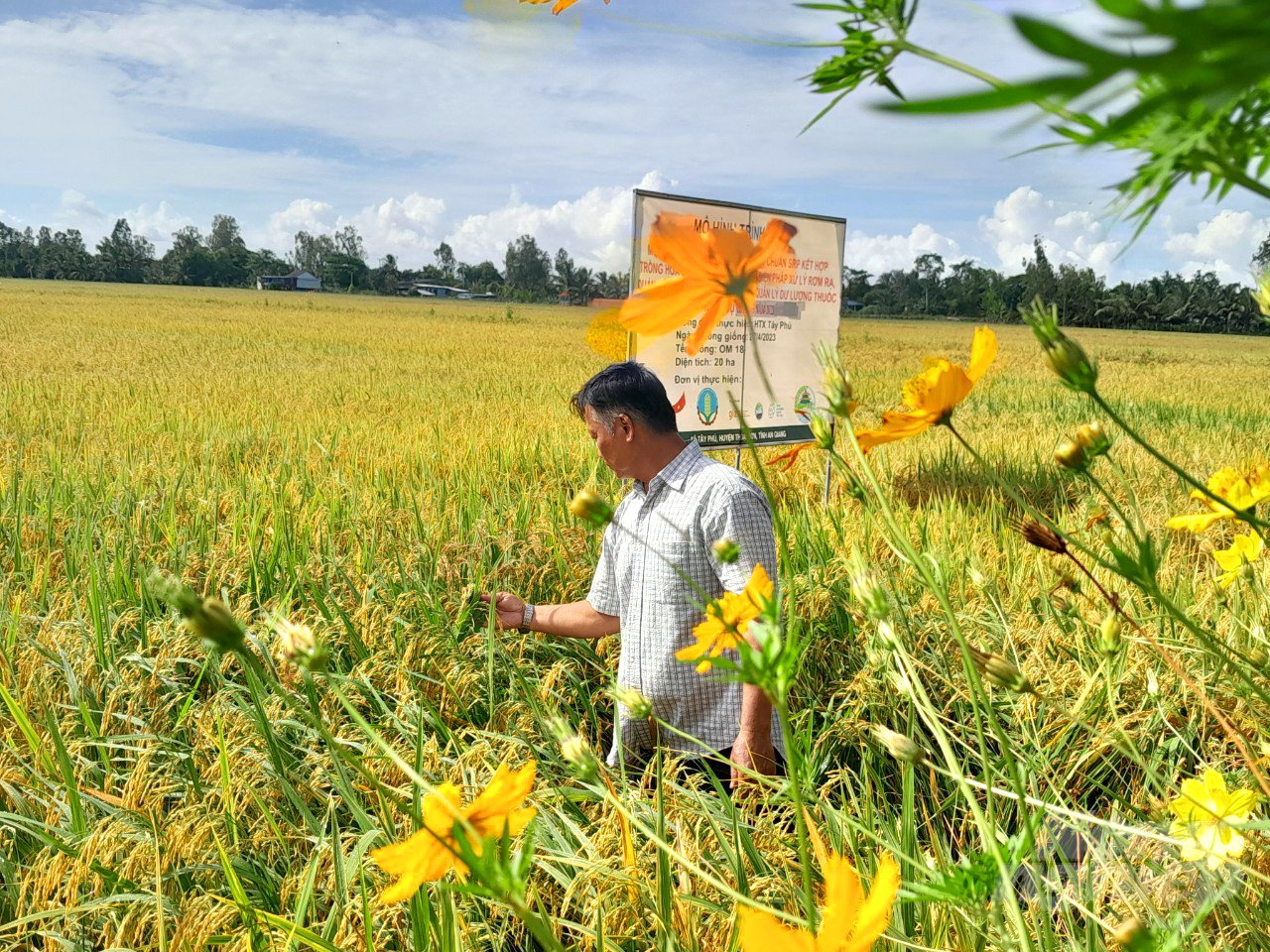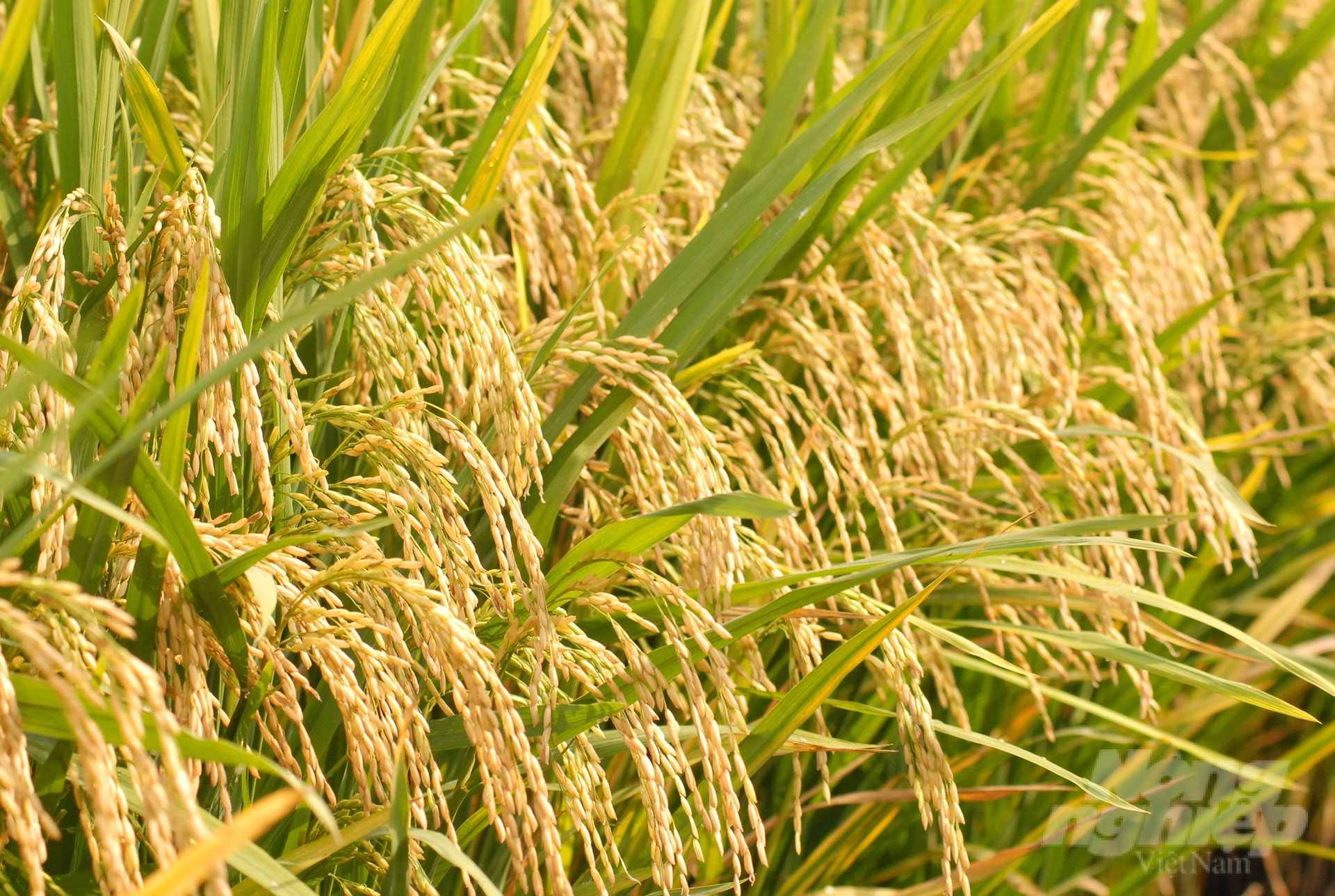May 16, 2025 | 15:43 GMT +7
May 16, 2025 | 15:43 GMT +7
Hotline: 0913.378.918
May 16, 2025 | 15:43 GMT +7
Hotline: 0913.378.918
The majority of farmers in An Giang province have changed their perceptions of rice production through participation in training programs that introduce scientific and technological advancements in agriculture. These programs, especially those conducted by the local Department of plant protection, have helped farmers gain a clearer understanding of the importance of complying with standards. As a result, farmers are gradually adjusting their production methods to meet the demands of both the domestic and export markets. They are working towards sustainable rice production, reducing emissions and environmental impact, and contributing to the overall development of the rice industry.

Sustainable SRP-compliant rice production in combination with ecological flower cultivation in the fields helps farmers reduce costs by 15 to 18% and increases profits by 18 to 20%. Photo: Le Hoang Vu.
Sustainable SRP-compliant rice production in combination with ecological flower cultivation in the fields, straw management, integrated pest management (IPM), and reduced pesticide residues, has been actively adopted and applied by farmers. The model promotes eco-friendly rice production with a focus on environmental protection and reducing emissions. Additionally, it helps reduce input costs by 15 to 18% and increase profits by 18 to 20%, which is equivalent to 4.8 to 5 million VND per hectare compared to traditional production methods.
Sustainable rice production based on the "1 must, 5 reductions" principle not only reduces production costs and increases profits but also enhances product quality, elevates the value of rice grains, minimizes environmental pollution, and prioritizes human health.
According to statistics from the agricultural sector in An Giang province, under the Green Innovation Centers in Agriculture and Food (GIC) project, the province has seen over 2,500 farming households apply innovative "green and smart" solutions to mitigate the impact of climate change.
The Green Innovation Centers project has supported the implementation of six sustainable SRP-compliant rice production models in combination with ecological flower cultivation, straw management, integrated pest management (IPM), and reduced pesticide residues in An Giang province. One of these models was deployed at the Tay Phu Agricultural Cooperative in Thoai son District. Subsequently, the project covers an area of 20 hectares with eight participating households. Furthermore, the model has been implemented since April 2023. The An Giang province's Agricultural Extension Center recently organized an evaluation workshop for the model with the participation of over 60 farmers and various representatives, including the heads of An Giang province's Agricultural Extension Center, the Department of Agriculture and Rural Development, the Farmers' Union, agricultural stations, and the GIC – GIZ Project Management Board.

The benefits of sustainable rice production practices include enhanced economic value, increased profits for farmers and various positive environmental impacts.
Farmers who visited the model fields were impressed by the healthy and vibrant appearance of the rice plants, which had large, strong and resilient stems. Additionally, the fields were adorned with various types of flowers, such as chrysanthemums, sunflowers, Sulfur cosmos, and okras, creating a beautiful and environmentally-friendly scene.
According to Mr. Bui Van Thanh, a rice farmer from Tay Phu commune, Thoai Son district, An Giang province who participated in the model, he used the certified OM18 rice variety for the 2023 summer-autumn crop. With the help of the model, he received training on advanced agricultural techniques, including the "1 must, 5 reductions" approach, integrated pest management (IPM), ecological technology, sparse planting, pest prevention, and SRP standards.
According to Mr. Bui Van Thanh, farmers are recommended to treat the straw residue with biological product R1 to reduce straw burning, which is a requirement for SRP-compliant rice production. This practice also provide additional nutrients to the soil. Additionally, SRP-compliant rice production resulted in a 15 to 18% reduction in fertilizer and pesticide costs compared to traditional farming methods, and a higher yield of 130 to 150 kilograms per hectare compared to control fields. Moreover, the final rice product must not exceed the allowable residue levels. As a result, the purchase price for SRP-compliant rice products is 200 VND per kilogram higher compared to those produced through tradional methods.
Mr. Thanh also planted flowers on both sides of his fields to attract beneficial insects and create a beautiful, environmentally-friendly landscape. This practice helped reduce pests on rice, which resulted in a 10 to 15% reduction in investment costs compared to tradional rice production methods.
"I will continue to apply these advanced agricultural techniques for subsequent rice crops. I also hope that the local agricultural sector will expand this model to neighboring farmers in the province in the near future", Mr. Bui Van Thanh expressed.
The production of environmentally-friendly and health-conscious agricultural products is a major focus for An Giang's agricultural sector. Many local businesses in the rice industry have prioritized partnerships and purchases of items produced using advanced technology and environmentally-friendly processes with no harmful chemical residues. Furthermore, An Giang province's Agricultural Extension Center is encouraging local farmers to produce in a sustainable and environmental friendly manner. In response, tese efforts have been widely welcomed and implemented by local farmers.

The technological advancements applied in sustainable rice production and the "flower-bordered rice fields" model serve as a crucial foundation for the implementation of the Integrated Pest and Health Management program. This program focuses on the comprehensive management of plant health and pest control in agriculture. Photo: Le Hoang Vu.
Mr. Tran Nhat Linh is an agricultural extension officer from the Thoai Son District Extension Center who directly monitors the model and supports farmers in implementing SRP-compliant rice production based on the "1 must, 5 reductions" approach and integrating ecological flowe cultivation. According to him, farmers previously had the habit of sowing seeds at a high density ranging from 180 to 250 kilograms per hectare. After participating in the model, they have been trained to utlize advanced scientific and technological knowledge that focuses on environmentally friendly, clean, and eco-friendly production. As a result, farmers have recognized their benefits and actively promoted their application.
According to Ms. Huynh Dao Nguyen, Director of the An Giang province's Agricultural Extension Center, the local models adhered to various technical foundations such as the "1 must, 5 reductions" approach, integrated multiple improvements into the production model, including the application of the "ecological flower-bordered rice fields" technique to attract beneficial pests to limit harmful ones. As a result, the models helped farmers reduce the frequency of pesticide spraying, balance the ecosystem in the fields, protect the agricultural ecosystem, preserve the soil and rice quality as well as the health of producers and consumers.
In addition, the models also apply biological products to process rice straw, reducing their burning and preventing organic poisoning, thereby reducing greenhouse gas emissions. Local agricultural sectors have prioritized the implementation of policies and programs in cooperatives to encourage farmers' participation. On the other hand, the models allowed farmers to apply comprehensive range of technological advancements and establish linkages with product consumption.

The most prominent features of sustainable farming models include the healthy rice plants and the protection of ecological environment. Photo: Le Hoang Vu.
The Green Innovation Centers for Agriculture and Food project is being implemented across six provinces in the Mekong Delta region to promote the development of production models and value chains for two key agricultural products: rice and mangoes.
The GIC project will provide training for approximately 20,000 participating farmers and beneficiaries in the project area.
The project's goal is to support income improvement for small-scale producers, create additional employment opportunities, enhance the resilience of rice and mango value chains through competitive business models. Additionally, it aims to minimize environmental impacts, enabling stakeholders in the value chains to apply innovative solutions for sustainable business development, climate adaptation, and increased profitability.
Translated by Nguyen Hai Long

(VAN) Cold-barn systems efficiently manage environmental and temperature conditions, which aids in the prevention of respiratory diseases in pigs and protects them from the vectors that transmit African swine fevers.

(VAN) To tackle challenges, the project 'Addressing key technical bottlenecks in the grouper supply chain in Vietnam' has been underway since 2024.

(VAN) The project 'Disease-Resilient and Sustainable Cassava Production Systems in the Mekong Region', funded by the Australian Center for International Agricultural Research (ACIAR), is being implemented from 2024 to 2028.

(VAN) Data from 10,000 farming households will help professionalize production organization and support the implementation of the One Million Hectares Program for High-Quality, Low-Emission Rice Cultivation.

(VAN) FAO Director-General QU Dongyu marks International Day of Plant Health at NENA conference.

(VAN) Deputy Minister of Agriculture and Environment Hoang Trung affirmed that floriculture and ornamental plants are a growing industry that receives significant global attention.

(VAN) The three staple crops dominating modern diets – corn, rice and wheat – are familiar to Americans. However, fourth place is held by a dark horse: cassava.